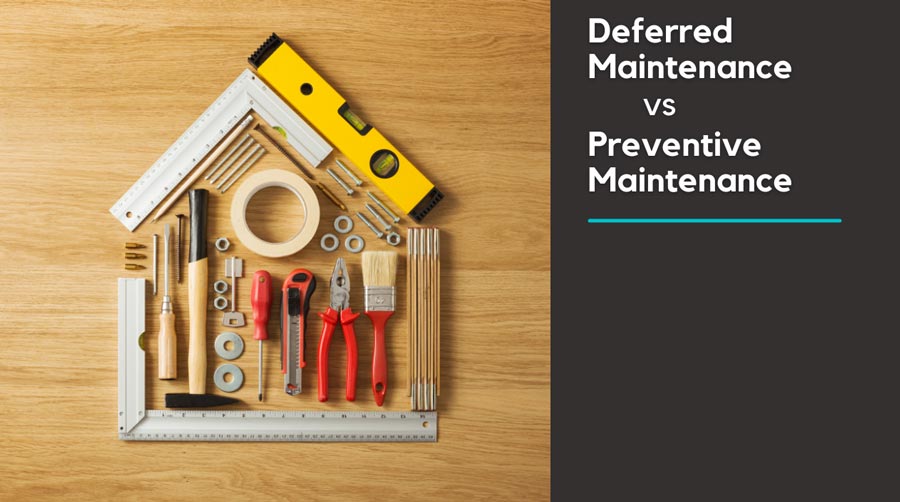
Deferred Maintenance vs. Preventative Maintenance
The above conversation I have daily with owners of investment properties that we currently manage. In this article, we'll be talking about the difference between preventative maintenance vs. deferred maintenance. Also, there is a difference between these two and high maintenance.
Three easily defined items, right? Well, yes, and no. Practical experience informs that. Indeed, this isn't completely cut and dried. You know the old saying, "One man’s trash is another's treasure"? It is, primarily, a matter of perception.
In other words, perception is a reality.
Table of Contents
Deferred Maintenance
Well, look at that, a can of worms. Just sitting there. All opened and stuff.
I wrote an article some time ago mostly revolving around deferred maintenance and wood rot. However, that article only skimmed the surface of the topic as a whole. In that article, I touched on some personal experiences I witnessed in the field that, to me, were horrifying. I have always intended to circle back to the topic at large.
The bottom line is this: lack of preventative (and other) maintenance is mostly the cause of deferred maintenance. By deferred we mean items that are put off, right now, until a time to be defined later.
These are items that ought to be done, but for whatever reason is either not reported by the resident ("because my rent may go up!") or the property owner is not in a financial, or logistical, position, at that time to correct said item.
To keep deferred maintenance in check, you must regularly attend to the upkeep of your property; it is as simple as that. I will dig down a little later on this.
Preventative Maintenance
I recently wrote an article about this very topic of “Preventative Maintenance” then stumbled upon the following article; where I stole this next little segment. Hey, most of my stuff is original, but sometimes a well-written analysis is just too good to pass up:
"One popular [rule] says that one percent of the purchase price [or value] of your home should be set aside each year for ongoing maintenance. For example, if your home costs $300,000, you should budget $3,000 per year for maintenance."
In my experience, this is a pretty good rule of thumb to follow. By saving and allotting funds for the upkeep of your property, you are ensuring that five, 10, 20 years down the line, your property will still be in relatively pristine condition, and that translates to the actual value. Speaking of savings, see how to have the money for repairs when you need it. Check out do you have a “piggy bank” set up for your investment property? If you don’t have one, you should!

However, if a property owner consistently delays preventative maintenance until "later, later, later," that cost will invariably rise. Said item(s) will decay further, exacerbating the needed work (making the repair more costly) and, well, have you ever heard of money gaining value? Nearly never happens. Each year that dollar in your pocket buys less. Remember nickel candy bars? I do. Yep, I'm ancient, a veritable fossil.
Homes
I have seen a good many properties in my travels. That isn't hyperbole. I've touched all the properties we manage at one point or another, many of them multiple times. I have been to well over 1,000 homes for insurance cases, and for the banks, well, that is in the high hundreds, at least. In other words, there's not a lot I haven't seen.
I have seen owner-occupied and rental units in this mix as well. I do not think that anyone will argue with the following statement:
“A renter ~usually~ will not take care of a home as well as an owner-occupied home.” However, one of our goals at Management One is to get residents and inspire residents, to think of their rentals as homes. Their home. Think about it, all the trials, tribulations, joys, sorrows, happy events, and such, which comprise the experiences of their lives, occur at these homes, rentals or not. The resident pays for the right to call it home, so why not call it home? Anyone?
Deferred Maintenance Horror Stories
Having said that, I have seen cases of both resident abuse and owner abuse. "Wha? I don't live there, how dare you..." Please allow me to clarify.
Resident abuse is pretty straightforward, and holding a resident accountable is too. "You break it; you bought it" sort of applies here. Aside from things that wear out or break, due to time and wear and tear, (and that list is vast, by the way), items that a resident breaks, or damages, can be charged to said resident, provided the law in your area, and Fair Housing, agrees with you.
What I mean by owner abuse is the operative work in this article: deferred maintenance. It is a weird sort of self-abuse, really. And I mean that with all due respect and in the best possible spirit.
You see, working with insurance companies and banks, I have seen, in person, homes that were so dilapidated, in such poor condition, that they could easily be classified as slumlord properties. None of the properties we manage fall into this class, by the way. Most were rentals. On the other hand, that ratio of well-kept to poorly kept homes is almost exactly reversed when it comes to homeowners vs. renters. Many times the shoddiness of a home is a result of deferred maintenance.
We're talking wrecked roofing, walls with holes in them, broken glass in windows, significant water damage, heaving walkways, open electrical sockets, and more. Most astounding is that these people pay rent to live there! As I said in a previous article, these folks would report nothing, for fear their rent would go up. So, realistically, they do not view these homes as homes, but as rentals.
By the way, news flash! Rent goes up mostly due to market forces. It’s as simple as supply and demand.
Hey, here's a fun movie to watch, The Super (1991), which highlights the perils of sub-par properties.
Preventative Maintenance: What to Look At
Let's drill into this a bit. Logic plays a role in preventative maintenance but so does emotion to a degree when it comes to property care. Preventative maintenance is part of Proactive Property Care. It is also, oddly enough, a bit of a balancing act, weighing need, vs. cost, vs. impact vs. Return on Investment, or ROI.
- Let's look at your property. I do this at every house I encounter. On the outside of the property:
- How does the home present from the road (curb appeal)?
- How does it look on a walk-around?
- Is the color scheme of the house contemporary? Is it peeling or threadbare?
- The siding (actual siding of any kind, including stucco, is it pooching out anywhere?
- Is there a pool, and if so, how do the equipment, plaster, and tiles look?
- Driveway, walkways, concrete, heaving? Un-level? Is vegetation responsible?
- Is there vegetation touching any part of the house, particularly the roof?
- Any odd things sticking out of the ground?
- The AC condensate and other water evacuation areas, clear and draining correctly?
- The AC unit condenser (the outside unit) is it free of damage and debris?
- The windows, do they keep the cool in, warm out, and vice versa?
- A Lot of Stuff?
No, not really. Do it a few times, and it becomes second nature.
In reviewing the list above, several items are as important as the curb appeal and the home's kitchen.
Let’s start with the curb appeal.
There are many things to consider here. First, how the elevation of the house relates to someone pulling up, never having seen the house before. This is either "angels singing from the heavens above when you look at the house, " or the classic cartoon warbling "wha wha wha whaaaaaa" sound effect. Come on, use a little imagination here.
Now, every region has its “angels vs. cartoon” sweet spots, so I'll leave it at that. Okay, a couple of hints: If the landscaping looks awful, fix it. The roofline and architecture are retro 50's, (and not in a good way), fix it. If the overall impression includes a dark recessed porch, and a damaged worn-out driveway, fix it. Maybe you can get by for the short term, but...
The Walk Around
Here you're assessing much of the same things as the curb appeal check, but up close and personal. And you are looking at all the items numbered 3 through 11. You're assessing it all. Oh, and lose the rain gutters. Your roof was engineered to drain water away from the foundation just fine.
Paint
If you need paint, due to its peeling, do it as soon as possible! The longer that wood is exposed, the more likely wood rot will set in. And by definition, waiting is deferred maintenance. That goes for the home and any attached wood. If the patio cover is wood, consider replacing it with an Alumawood type product. There is nothing more wasteful than continually throwing money at an item that will just require more money thrown at it in a couple of years. When you decide to paint, do so in contemporary colors. Right now, brown and tan are a safe choice. Blue is not. In a recent survey, only 6% of residents liked a blue house, which means you just lost 94% of renters, and your property might sit vacant for a very long time.
Pooching Siding - this is a bad thing
Years ago, my next-door neighbor, let's call him Tom, had his exterior stucco walls punctured and all new insulation pumped into his walls. I don't know who sold him this bill of goods, because, in California, there are what is called Fire Blocks installed in these walls. These are the horizontal 2x4's, seemingly at random heights, between the vertical wall stud 2x4's, and intended to keep the exterior walls from acting as mini chimneys should a fire break out. These folks just pumped in the insulation wherever, at random. That means the insulation pumped in could not possibly fill the whole wall and seemed to be pumped in a little low.
Lo and behold, his stucco started sagging out a couple of years later. I was not yet educated in this stuff yet, so I thought nothing of it. "Hey, cool, look, Tom's walls look crazy!"
Well, Tom had a problem: the insulation was somehow picking up, and keeping, moisture. The insulation was swelling up and pushing the exterior walls out. And you know what? This happens more often than you may think.
Moisture + dark, poorly ventilated area=mold. Not solving this issue is not an option. You cannot defer this.
Pools
This is a sticky wicket. I'm currently working on a couple of pools that have seen their fair share of deferred maintenance. Tile pops off, plaster that gets past its intended life, leaking pumps, all that. However, a pool adds about $125 or more to the perceived value/price of a rental, sometimes a lot more, a pool actually is a good deal more than a large hole in the ground that you toss maintenance money into monthly. We would recommend saving aside money each month to be used for pool maintenance. Pumps will fail. The plaster will fail. Leaks will happen. Considering the cost of filters, heaters, there are just so many items that will cost you money, someday, why not be ready for this?
Heaving Pavement
In this, we're going to call it what it is: uneven walking surfaces. That would be sidewalks, driveways, walkways, and even the yard. If it presents a trip hazard, it needs to be addressed.
More often than not, uneven walking surfaces occur due to things like tree roots working their way to the pavement in search of water and stability. Yet, most of the time, this is foreseeable and preventable. Choose your trees and such for their beauty, and they projected root growth. Plant your trees with a thought as to how they will impact your property 20 years down the road.
However, once the tree starts lifting things, it must be dealt with. Less than 3" rise of pavement poses what is called a "Minor Concern" regarding being a trip hazard. Greater than 3" is called a Major Concern. Yet, bear in mind that a minor concern can still get you in court should someone claim to have tripped. Best to get it now, rather than later. Management One was involved with the owner in a four-year lawsuit over someone tripping over a raised walkway. So we must pay attention to these situations.
Remember the list at the beginning of the article? Heaving pavement falls under item 8 - odd things sticking out of the ground. If it can trip someone, lose it.
Them Pesky Trees
Are there trees or other vegetation touching your roof or siding? Get. Rid. Of. It. That roof can easily be worn down by persistent winds brushing branches and leaves across it. The same mostly applies to ground-level vegetation, because these can also harbor rats and insects, and as a bonus, can serve as fuel, spreading fire to your structure.
Drainage - AC and Other
I just saw this the other day. I walked up to the front door of the home; I noted water leaking out of the side of the house, at the bottom of the stucco. In the area, I noted both the AC condensate line and the water heater pressure relief line. However, the water was not coming out of either of these lines, at least not as designed. That water was running freely via some sort of break. This is not something to be deferred. Water leaks and your investment = not friends.
AC units must also have regular maintenance done, such as filter, at the very least.
Window and Doors
There is a lot of truth to the saying, "if it ain't broke, don't fix it." However, years ago, I ran into a former sheriff's deputy who now flips homes. Clearly, he was insane.
When I arrived at his current project, half the windows were removed, and he was replacing them all with aluminum-framed windows. I looked over the older vinyl framed windows and could find nothing wrong with them. I asked the man why he was doing this, as it didn't seem that the ROI would be worth it on a flip. This man stated that, while the ROI was minimal, he felt better about himself replacing these windows. He stated that radial cracks from expansion and contraction of the window frames are far less with aluminum than with vinyl frames. Simply put, he said he would feel bad selling a flip with vinyl framed windows. This is an example of putting money in the wrong place, in my opinion.
However, if you have a cracked window and do not replace it, you are not only perpetuating deferred maintenance, you are risking someone getting injured.
Preventative Maintenance: A Look Inisde
Flooring, is it in good condition, and is it compatible with long-term use at a reasonable cost? (careful here!)
Walls - plaster and lathe? Drywall? Is it pooching out anywhere?
Tubs and showers - any holes or damage?
The kitchen - the heart of the home - what condition is the dishwasher in, inside, and out? Stove? Oven? Counters? Sinks?
Generally, flooring ought to be replaced when it needs replacing. I could easily give you lifespans that are standard; however, each house, wear, and budget is different. If I can get another two years out of carpet on a rehab, I'm going to get those couple of years. However, when it comes time to replace that carpet, look for a longer life product, such as laminate.
Pooching walls, as I mentioned previously, ought to be addressed as soon as possible. Something is causing it, best to find out what and correct it all in one shot.
Tubs and showers, if you can Aquamend a fiberglass enclosure, do it! I recently ran into an owner doing his own rehab, and he was so stoked at having re-glazed every tub and shower stall that he positively glowed. At $400+ per unit, he spent $1,200 additional dollars, which he ought to have saved; the unit did not need it! However, being who he is, he felt better about doing this. On the other hand, that money could be used for flooring, which really did need it.
Where the Big is: The Kitchen
The kitchen is the heart of the home, right? Right. It is where your meals are prepped. It is the heart of the home, really. It is a focal point, one where the optics are super important. If your kitchen is drab, dirty, unattractive, you will probably not get the price, sale-wise or rental-wise. However, again, if it all works, and is reasonable in appearance, it can be deferred for later.
In a Nutshell
I went way over my word limit on this article because really, there is so much here that I could easily write a book. To boil this topic down, a lack of preventative maintenance leads to deferred maintenance. A lack of maintenance, and shoddy maintenance, also lead down this road. At the end of the day, to add a cliché, that little bit you save, right now by deferring repair can cost you a whole lot of money later.
At the same time, always ask yourself, “I'm about to spend, how does it affect my return on investment?”
A few years ago, I worked with an owner on a rehab. The owner was doing the work. That owner would not spend for this, that, and the other thing - all needed - but went out and bought a beautiful custom wood gate (stained cedar with iron inserts) leading to the back yard. An amenity such as this gains no measurable value for the property; thus, it had a poor ROI.
If something is necessary, spend, but spend wisely, so when that extensive repairs hit, and they will, you have the funds to cover it.
Take away lesson: Do preventative maintenance along the way, to avoid costly repairs. It’s ok to defer maintenance if there is a plan to take care of the needed repair before it becomes a massive challenge. Do you have a “piggy bank” to handle these repairs? If not, you should get one TODAY!
A quick word of thanks...
By the way, thank you for reading our blogs! We put a lot of time and energy into our articles, and we thank you for taking the time, and effort, into reading that which we offer!
If you have questions about managing your property, ask us, we'll be happy to tell you all about it!










